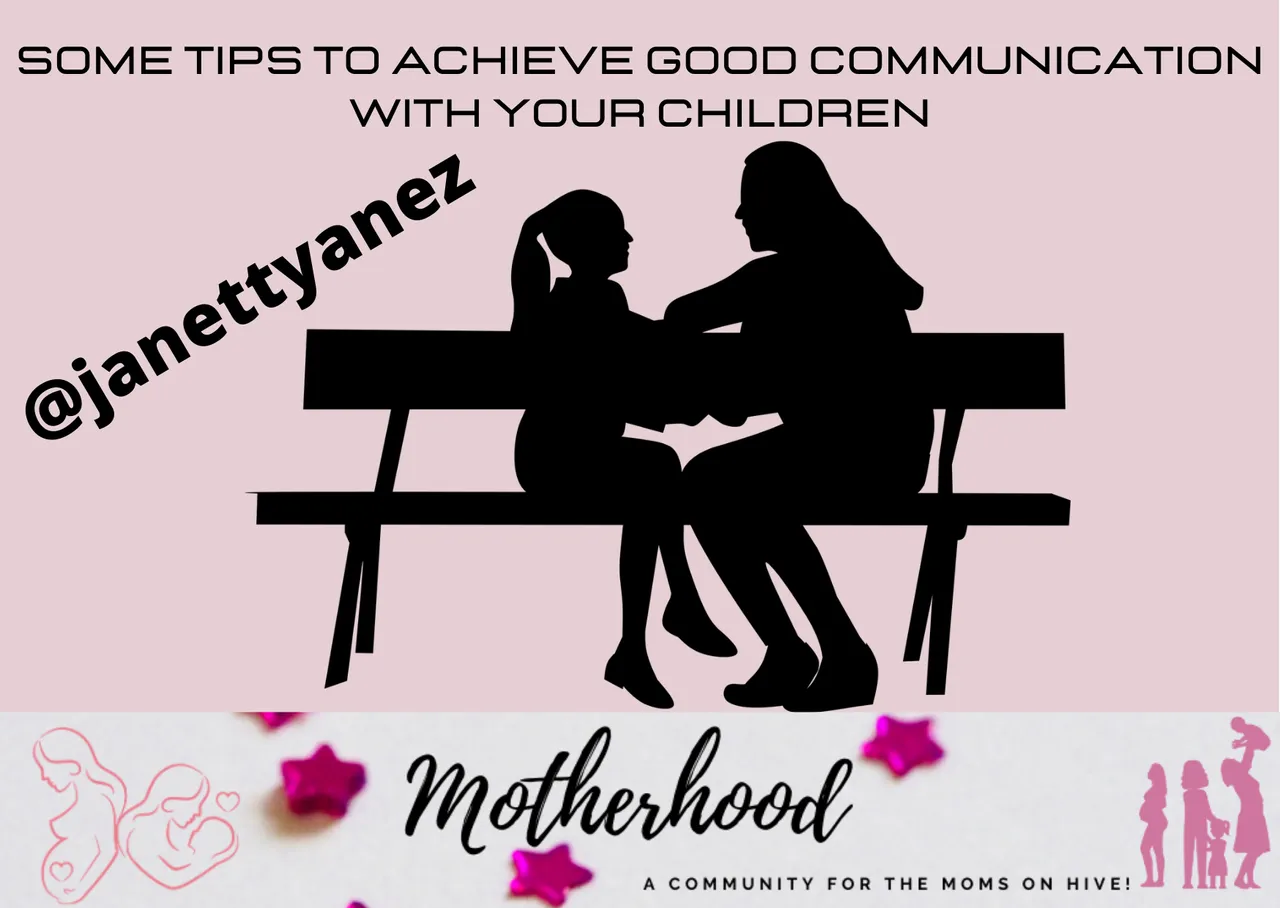Una de las preocupaciones mas comunes que tenemos como padres es lograr una buena comunicación con nuestros hijos.
¿Quién no ha tenido problemas para comunicarse con sus hijos? en algún momento o etapa de sus vidas.
Esta interrogante da inicio a mi publicación,como punto de partida, para presentar algunos planteamientos relacionados con este tema, basados en mi experiencia como hija, madre y abuela.
¿Quién no ha tenido problemas para comunicarse con sus hijos? en algún momento o etapa de sus vidas.
Esta interrogante da inicio a mi publicación,como punto de partida, para presentar algunos planteamientos relacionados con este tema, basados en mi experiencia como hija, madre y abuela.
One of the most common concerns we have as parents is to achieve good communication with our children.
Who hasn't had trouble communicating with their children? at some point or stage in their lives.
This question starts my publication, as a starting point, to present some approaches related to this issue, based on my experience as a daughter, mother and grandmother.
Who hasn't had trouble communicating with their children? at some point or stage in their lives.
This question starts my publication, as a starting point, to present some approaches related to this issue, based on my experience as a daughter, mother and grandmother.

Adaptación con Canva de Imagen Libre de Pixabay.com


La comunicación entre padres e hijos siempre ha sido y será una de las mayores preocupaciones que tenemos y que mayormente en la etapa de adolescencia representa un dolor de cabeza, por lo difícil en sí que es vivir esta etapa.
Recuerdo como hija que nuestros padres con solo mirarnos o hacer una señal con los ojos, era suficiente para salir corriendo del lugar sin preguntar, quizás no es exactamente el mejor ejemplo de comunicación pero de que era eficaz lo era.
Como todos, sufrí en carne propia los cambios de la adolescencia, donde pensaba que todos los adultos eran mis enemigos afirmando "que ellos querían que yo hiciera lo que ellos decían".
Ciertamente en el pasado, los padres generalmente veían la comunicación con sus hijos desde otra perspectiva, donde prevalecía la autoridad, el establecimiento de normas y hasta el cuestionamiento.
Todo esto a través de los años ha cambiado, debido a no solo los avances en esta materia sino también por las experiencias vividas de una generación a otra que nos ha permitido orientar a nuestros hijos sobre este tema.
Recuerdo como hija que nuestros padres con solo mirarnos o hacer una señal con los ojos, era suficiente para salir corriendo del lugar sin preguntar, quizás no es exactamente el mejor ejemplo de comunicación pero de que era eficaz lo era.
Como todos, sufrí en carne propia los cambios de la adolescencia, donde pensaba que todos los adultos eran mis enemigos afirmando "que ellos querían que yo hiciera lo que ellos decían".
Ciertamente en el pasado, los padres generalmente veían la comunicación con sus hijos desde otra perspectiva, donde prevalecía la autoridad, el establecimiento de normas y hasta el cuestionamiento.
Todo esto a través de los años ha cambiado, debido a no solo los avances en esta materia sino también por las experiencias vividas de una generación a otra que nos ha permitido orientar a nuestros hijos sobre este tema.
The communication between parents and children has always been and will be one of the biggest concerns that we have and that mostly in the stage of adolescence represents a headache, because of how difficult it is to live this stage.
I remember as a daughter that our parents just by looking at us or making a sign with their eyes, it was enough to run out of the place without asking, maybe it is not exactly the best example of communication but that it was effective it was.
Like everyone else, I suffered firsthand the changes of adolescence, where I thought all adults were my enemies by stating "that they wanted me to do what they said."
Certainly in the past, parents generally viewed communication with their children from another perspective, where authority, standard-setting, and even questioning prevailed.
All this over the years has changed, due not only to the advances in this area but also to the lived experiences from one generation to another that has allowed us to guide our children on this subject.
Mi experiencia como madre en relación a la comunicación con mi hija me ha resultado satosfactoria, debido a que siempre me dedique a estudiar el tema, asi como estoy atenta a cualquier cambio que ocurre.
Sin embargo es importante tomar en cuenta que existen diversas etapas de la vida de nuestros hijos que por alguna razón tiende a dificultar la comunicación e inclusive puede afectarse significativamente, sino se hacen los correctivos necesarios para evitar que esto ocurra.
A continuación les presento algunos tips que a través de los años fui aprendiendo de las experiencias como madre y como abuela:
1. Debes transmitirle confianza a tus hijos, ellos necesitan un aliado que no los cuestione, esto no quiere decir que como padres no vayas a orientarlo oportunamente. Hazlo pero que lo vea como algo opcional, inclusive que suene a recomendación o sugerencia, donde él tiene la responsabilidad de elegir si le sirve o no, brindale ese voto de confianza que te aseguro que no te va a defraudar.
2. No lo cuestiones, busca la forma de hacerle ver lo que esta haciendo mal o que no le conviene, a nadie le gusta que los cuestionen, cuando lo hacen se aleja y se encierra, buscando ayuda en otra persona.
3. La comunicación debe ser constante y con la mayor frecuencia posible, no hay excusas, sino no se tiene tiempo para hablar con nuestros hijos entonces no existirá una formula mágica que haga que las cosas salgan bien.
4. No lo interrumpas cuando te esta contando algo que para él es muy importante, deja que se exprese y diga todo lo que quiere decir; suele ocurrirno que la ansiedad o la angustia ante lo que nos está contando, nos hace interrumpirlo y se corta ese hilo de comunicación tan importante que se inició.
5. Todo lo que hables con tus hijos "es importante" recuerda eso siempre.
6. Siempre escuchalo, que vea en ti un aliado incondicional que quiere lo mejor para él.
Sin embargo es importante tomar en cuenta que existen diversas etapas de la vida de nuestros hijos que por alguna razón tiende a dificultar la comunicación e inclusive puede afectarse significativamente, sino se hacen los correctivos necesarios para evitar que esto ocurra.
A continuación les presento algunos tips que a través de los años fui aprendiendo de las experiencias como madre y como abuela:
1. Debes transmitirle confianza a tus hijos, ellos necesitan un aliado que no los cuestione, esto no quiere decir que como padres no vayas a orientarlo oportunamente. Hazlo pero que lo vea como algo opcional, inclusive que suene a recomendación o sugerencia, donde él tiene la responsabilidad de elegir si le sirve o no, brindale ese voto de confianza que te aseguro que no te va a defraudar.
2. No lo cuestiones, busca la forma de hacerle ver lo que esta haciendo mal o que no le conviene, a nadie le gusta que los cuestionen, cuando lo hacen se aleja y se encierra, buscando ayuda en otra persona.
3. La comunicación debe ser constante y con la mayor frecuencia posible, no hay excusas, sino no se tiene tiempo para hablar con nuestros hijos entonces no existirá una formula mágica que haga que las cosas salgan bien.
4. No lo interrumpas cuando te esta contando algo que para él es muy importante, deja que se exprese y diga todo lo que quiere decir; suele ocurrirno que la ansiedad o la angustia ante lo que nos está contando, nos hace interrumpirlo y se corta ese hilo de comunicación tan importante que se inició.
5. Todo lo que hables con tus hijos "es importante" recuerda eso siempre.
6. Siempre escuchalo, que vea en ti un aliado incondicional que quiere lo mejor para él.
My experience as a mother in relation to communication with my daughter has been satisfying, because I am always dedicated to studying the subject, as well as I am attentive to any changes that occur.
However, it is important to take into account that there are various stages of our children's lives that for some reason tend to hinder communication and can even be significantly affected, otherwise the necessary corrective measures are made to prevent this from happening.
Below I present some tips that over the years I learned from the experiences as a mother and as a grandmother:
- You must transmit confidence to your children, they need an ally that does not question them, this does not mean that as parents you will not guide them in a timely manner. Do it but see it as something optional, even that sounds like a recommendation or suggestion, where he has the responsibility to choose whether it serves him or not, give him that vote of confidence that I assure you that it will not disappoint you.
2. Do not question it, look for a way to make you see what you are doing wrong or that does not suit you, nobody likes to be questioned, when they do you walk away and lock himself up, looking for help in someone else.
3. Communication must be constant and as often as possible, there are no excuses, but we do not have time to talk to our children then there will be no magic formula that makes things go well.
4. Do not interrupt him when he is telling you something that is very important to him, let him express himself and say everything he wants to say; it usually does not happen that anxiety or anguish at what he is telling us, makes us interrupt it and that very important thread of communication that was started is cut.
5. Everything you talk to your kids "is important" always remembers that.
6. Always listen to him, let him see in you an unconditional ally who wants the best for him.

Espero que estos tips le sean de ayuda y recuerden nadie dijo que ser padres es fácil pero se aprende cada día algo nuevo para que se nos haga mejor disfrutar de esta matavillosa dicha.
I hope that these tips are of help to you and remember no one said that being a parent is easy but you learn something new every day so that we can better enjoy this wonderful joy.




